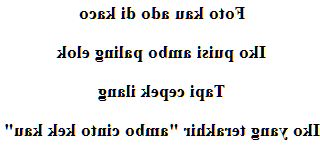Bengkulu love poem
Kaco
Foto kau ado di kaco
Iko puisi ambo paling elok
Tapi cepek ilang
Iko yang terakhir “ambo cinto kek kau”


→ French poem ←
Bengkulu language
Bengkulu (alternatives and dialects : Ogan, Pasemah, Lintang, Kikim, Central Malay, Semenda, Midden Maleisch, Rambang, Serawai, Enim, Besemah, Bengkulu, Benakat, Semendo, Kisam, Lematang Ulu), is an Austronesian, Mayalo-Polynesian language, spoken by the populations (pasemah, besemah) of Indonesia.
The word Bangkahulu (Bengkulu), which refers to the language and the people, is the glorious reminder of a great victory of their ancestors, who had driven back the Acehnese.
Bengkulu is a Malay language, having links with Palembang, Jambi, Minangkabau, and of course other Malay languages.
This translation of my poem is from the town of Bengkulu in South West Sumatra. About 2 million people speak this central Malay.
Bangkahulu and the Bengkulus
Bengkulu (Bangkahulu), formerly Benkulen or (Bencoolen, Benkoelen), is the largest city in South West Sumatra and in the past was an important region for the pepper trade. Today it is a place like many others in Indonesia very popular with tourists.
A bit of history: The Bengkulus are the descendants of several groups who came to the region, the Malays, Acehnese, Minangkabau, Javanese, Bugis, and Banten.
Much later, the British with the East India Company will settle in Benkoelen, for the pepper trade, the region being one of the main supplier. Benkulen, was then a densely populated city, which had a million inhabitants.
In 1824, the Dutch took Bencoolen from the English. Following this catch, English and Dutch, will ratify by a treaty exchanges of territories; the English giving up to the Dutch, their possessions in present-day Indonesia (Java and Sumatra), against those that the latter possessed in Malaysia.
This will result the begining of an emigration of the Bengkulu population, towards Singapore and the Malay Peninsula. An emigration in two phases and quite significant, since it is estimated that in a few years, a total of 50% of people will leave the city.
At first, following the treaty, the British left Bencoolen for Singapore and Malaysia, with the many Malays who worked for them.
In a second step, the Dutch domination, installed and judged much harder by the population, many others people will leave the town.